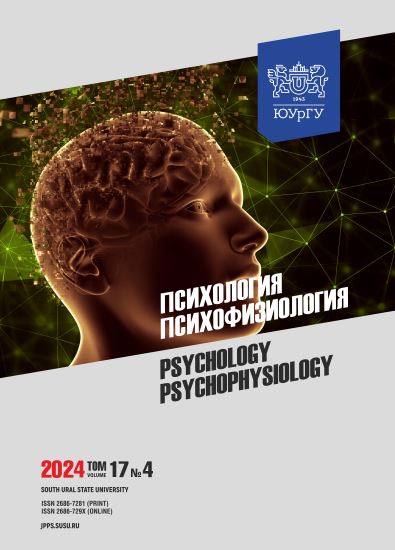Structural diversity of intuition: factor analysis of the rational-experiential inventory
Abstract
Introduction: In Russia, there is no tradition of classifying the structural diversity of intuition depending on the nature of incoming information. Therefore, such work may contribute to the systematization of knowledge about intuition in Russian psychological science. Aims: this study aimed to investigate the structural diversity of intuition among Russian-speaking participants by adapting and applying Western frameworks to the Russian-language context. Materials and methods: Following J.E. Pretz and K.S. Totz, a factor analysis (IBM SPSS Statistics 23.0) of the Rational-Experiential Inventory from 210 Russian-speaking individuals was conducted, employing Principal Axis Factoring with Promax rotation. Results: Our results revealed four latent factors, two of which were unrelated to the questionnaire’s scales. These factors indicate structurally distinct forms of intuition differing in the breadth of incoming information. Conclusion: This study contributes to further research into intuition being a starting point for creating new questionnaires for the structure of intuition and its forms.
Downloads
References
2. Nalchadzhyan A.A. Nekotorye psikhologicheskie i filosofskie problemy intuitivnogo poznaniya [Some psychological and philosophical problems of intuitive cognition]. Moscow. Mysl Publ. 1972:271. (in Russ.).
3. Luk A.N. Myshlenie i tvorchestvo [Thinking and creativity]. Moscow, Izdatelstvo politicheskoi literatury. 1976:144. (in Russ).
4. Rodionova I.K. O prirode intuicii [On the nature of intuition]. Problema otrazheniya i sovremennaya nauka [The problem of reflection and modern science]. Moscow. 1967:34–48. (in Russ).
5. Naumenko E.A. Vvedenie v teoriyu intuicii i intuitivnosti [Introduction to the theory of intuition and intuitiveness]. Tyumen, Izdatelstvo Tyumenskogo gosudarstvennogo universiteta. 2013:212.
(in Russ).
6. Hogarth R. M. Intuition: A challenge for psychological research on decision making. Psychological Inquiry. 2010;21(4):338–353. DOI: 10.1080/1047840X.2010.520260.
7. Glöckner A. Witteman C. Beyond dual-process models: A categorisation of processes underlying intuitive judgment and decision making. Thinking and Reasoning. 2010;16:1–25. DOI: 10.1080/13546780903395748.
8. Pretz J., Totz K.S. Measuring individual differences in affective, heuristic, and holistic intuition. Personality and Individual Differences. 2007;43(5):1247–1257. DOI: 10.1016/j.paid.2007.03.015.
9. Tversky A. Kahneman D. Judgment under uncertainty: Heuristics and biases. Science. 1985;185:1124–1131. DOI: 10.1126/science.185.4157.1124.
Fiedler K., von Sydow M. Heuristics and Biases: Beyond Tversky and Kahnemans Judgment under Uncertainty // Cognitive Psychology: Revisiting the Classical Studies / Eds. M.W. Eysenck, D. Groome. Publ. Sage Publications. 1974. Ch. 12. P. 146–161. Available at: https://www.researchgate.net/publication/280981235_Heuristics_and_Biases_Beyond_Tversky_and_Kahnemans_1974_Judgment_under_Uncertainty#fullTextFileContent (accessed: 15.04.2024).
11. Westcott M.R. Toward a contemporary psychology of intuition: A historical, theoretical, and empirical inquiry. Ed. by Holt, Rinehart and Winston, New York. 1968:228. Available at: https://archive.org/details/towardcontempora0000west (accessed: 15.04.2024).
12. Ghasemi O., Handley S. Logical Intuition Is Not Really About Logic. Journal of Experimental Psychology: Genral. 2022;151:2009–2028. DOI: 10.1037/xge0001179.
13. Bago B., De Neys W., Advancing the specification of dual process models of higher cognition: a critical test of the hybrid model view. Thinking and Reasoning. 2019;26:1–30. DOI: 10.1080/13546783.2018.1552194.
14. Remmers C., Zimmermann J., Topolinski S. Intuitive Judgments in Depression and the Role of Processing Fluency and Positive Valence: A Preregistered Replication Study. Clinical Psychology in Europe. 2020;2:e2593. DOI: 10.32872/cpe.v2i4.2593.
15. Vieira V., da Silva V., Gabler C. The impact of intuition and deliberation on acquisition-retention ambidexterity and sales performance: comparing the Dual-Process and Uni-Process Models. Journal of Personal Selling and Sales Management. 2020;41:1–14. DOI: 10.1080/08853134.2020.1845188.
16. Baldacchino L., Ucbasaran D. Linking experience to intuition and cognitive versatility in new venture ideation: a dual-process perspective. Journal of Management Studies. 2022;60:1105–1146. DOI: 10.1111/joms.12794.
17. Mudyń K. The place of intuition in the digitalized world. Sztuka Leczenia. 2024;39:39–49. DOI: 10.4467/18982026SZL.24.008.19833.
18. Epstein S. Cognitive-experiential Self-theory. Advanced Personality. 1998:211–238. DOI: 10.1007/978-1-4419-8580-4_9.
19. Gawronski B., Luke D., Creighton L. Dual-Process Theories. The Oxford Handbook of Social Cognition. Oxford. 2024:319–353.
20. Hill O.W. Intuition: Inferential heuristic or epistemic mode? Imagination, Cognition, and Personality. 1987;7:137–154. DOI: 10.2190/2L9K-57WM-M917-6FWN.
21. Sadler-Smith E., Shefy E. Developing intuitive awareness in management education. Academy of Management Learning and Education. 2007;6:186–205. DOI: 10.5465/AMLE.2007.25223458.
22. Maldei T., Baumann N. The Language of Intuition: A Thematic Integration Model of Intuitive Coherence Judgments. Cognition and Emotion. 2020;34(4):1183–1198. DOI: 10.1080/02699931.2020.1736005.
23. Isler O., Yılmaz O. How to activate intuitive and reflective thinking in behavior research? A comprehensive examination of experimental techniques. Behavior Research Methods. 2022;55:3679–3698. DOI: 10.3758/s13428-022-01984-4.
24. Isler O., Yılmaz O. Activating reflective thinking with decision justification and debiasing training. Judgment and Decision Making. 2023;15(6):926–938. DOI: 10.1017/S1930297500008147.
25. Bulychev I.I. About the essence, form and content of the category “structure”. Vestnik Tambovskogo gosudarstvennogo unversiteta = Bulletin of Tambov State University. 1998;2:3–10. (in Russ).
26. Asmus V.F. Problema intuicii v filosofii i matematike. Ocherk istorii: XVII – nachalo XX vv [The problem of intuition in philosophy and mathematics. An outline of history: XVII – early XX centuries]. Moscow: Vysshaya shkola Publ. 1965:312. (in Russ).
27. Kornilova T.V. Kornilov S.A. Intuition, intelligence and personality traits (results of testing the scales of the S. Epstein questionnaire). Psikhologicheskie issledovaniya = Psychological research. 2013;28:1–11. (in Russ).
28. Vasileva I.V., Grigorev P.E., Ignatov A.N. Theoretical model of intuition: rationale of inclusion of intuition of police officers into the generalized concept of intution. Vestnik Krasnodarskogo universiteta MVD Rossii = Bulletin of the Krasnodar University of the Ministry of Internal Affairs of Russia. 2017;2(36):232–236. (in Russ.)
Grigorev P.E., Vasileva I.V., Zaeva M.A. et al. Exploratory analysis of intuition factors. Pros-transtvo i vremya = Space and Time. 2015;1:377–382. (in Russ).
30. Pittenger D. Cautionary comments regarding the Myers-Briggs Type Indicator. Consulting psychology journal practice and research. 2005;57:210–221. DOI: 10.1037/1065-9293.57.3.210.
31. Kornilova T.V., Razvalyaeva A.Yu. The rationality and intuition scales in S. Epsteins questionnaire REI (Russian approbation of the full version). Psikhologicheskii zhurnal = Psychological Journal. 2017;3:92–107. (in Russ).
References on translit
-Copyright (c) 2024 Psychology. Psychophysiology

This work is licensed under a Creative Commons Attribution-NonCommercial-NoDerivatives 4.0 International License.



